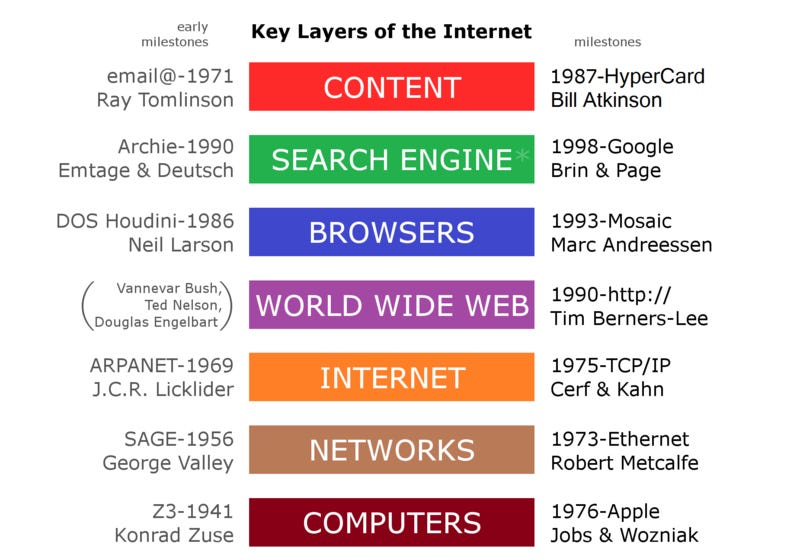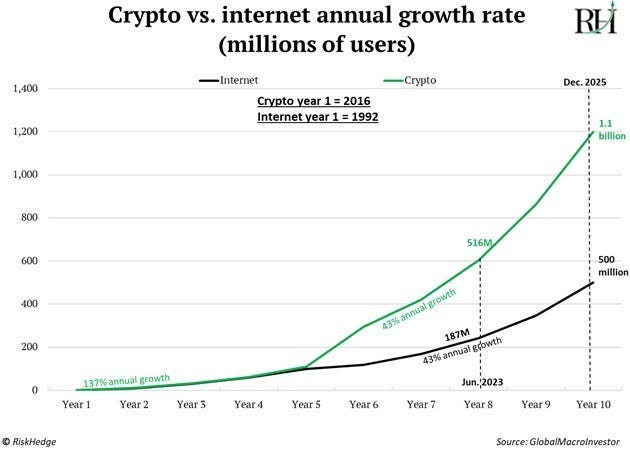Due to the inherent unpredictability of the future, I retain some skepticism towards Bitcoin. I follow a few of the naysayers like Catherine Austin Fitts, who believes Bitcoin will become part of a control grid and is a “pump and dump” scheme, although I have yet to see any evidence of her claim that “the 21 million limit is not hard.” I know plenty of people who still dismiss the buying of Bitcoin, never mind other cryptocurrencies, as gambling.
Image: Slot machine.png/ Wikimedia Commons
Nevertheless, with the approval of Bitcoin ETFs and the establishment of a strategic Bitcoin reserve, I think it’s fair to say the Bitcoin train has left the station. Recently I was reflecting on the timeline of Bitcoin adoption as compared to the timeline of internet adoption. How far along is Bitcoin in internet years?
As I’ve written about before, my library and information science program at The University of Texas at Austin was the first program to teach a class about the internet. Students learned how to telnet to a few sites and how to participate in message boards. After I started my first job at Fort Worth Public Library, in 1994, staff was granted email accounts and the public was provided with a short list of sites they could browse.
I joined the Peace Corps in 1995 and was sent to Africa; by the time I returned to the U.S. in 1997 I felt like I was entering a new world. I missed the beginning of widespread adoption of the internet that came with the debut of Microsoft’s Windows 95 and the bundling of Internet Explorer, as detailed in a CNET piece by Lori Grunin. Grunin describes 1995 as the “wonder year,” the year of a “tectonic shift” in which the internet went “from toddler to moody, awkward teenager,” with the number of sites shooting up from 23,500 in June 1995 to 100,000 in January 1996.
Image: Early internet (cropped).png/ Wikimedia Commons
Although development on the internet started far earlier, I think of 1992, the year I entered grad school, as the starting point of adoption by the public. People were using Bitcoin as early as 2010 (cryptocurrency development, like internet development, started far earlier), but I think of 2017 as the year it began attracting significant attention, although I hadn’t yet heard of Bitcoin myself.
The shift to widespread adoption of the internet that occurred from 1992-1997 can be attributed to companies such as AOL Online and Prodigy providing internet access to the public, the launching of browsers that made it seamless to surf the web, and the “piling on” of companies and other entities to the net. The search engine Google was launched in 1998 and the aughts saw the addition of social media sites with the arrival of Friendster and MySpace in 2003.
Image: Internet Key Layers.png/ Wikimedia Commons
While crypto exchanges that facilitate the direct purchase of Bitcoin have been around since 2011, more than a decade later Bitcoin is still somewhat difficult both to store and to use. That is rapidly changing. In 2015, the Lightning Network was conceived to overcome Bitcoin’s scaling restraints and make for faster payments; by 2021 it was being used by over 300 companies, projects, and apps. The Strike app, which launched in the U.S. in 2020, uses the Lightning Network to facilitate quick and easy Bitcoin payments. Strike launched in Europe in 2024. In December 2024, Strike announced a bill pay feature. In February 2025, Fold announced a Bitcoin rewards Visa credit card. On March 7, 2025, the OCC declared that banks can start offering cryptocurrency-related services, including custody.
Image: Bitcoin over Lightning Network.svg/ Wikimedia Commons
As these layers are added to Bitcoin to create a seamless user experience, will there be a takeoff in terms of adoption? If we start the timeline of public adoption of Bitcoin in 2017, eight years later are we beginning a rapid acceleration?
Searching the web on this question, I found multiple posts comparing Bitcoin and/or cryptocurrency timelines to the internet timeline. One writer compared overall cryptocurrency growth, using 2016 as year 1, and compared it to internet growth, using 1992 as year 1, providing a chart that shows higher adoption of crypto:
A writer at The Daily HODL, using similar charts (as far as I can tell) and the same starting years, provided this prediction from ex-Goldman Sachs executive Raoul Pal:
The internet, which was the fastest adoption of technology the world had ever seen, it grew by 76% per year and then slowed down after year eight to 43% a year.
Crypto has been growing at 137% a year. It’s now at 516 million users versus 187 million of the internet at the same stage.
Then what we did is assume that crypto just slows down its growth to the same as the internet. I don’t think that’s going to happen. I think it will be faster, but by the end of 2025, we get to 1.1 billion users.
Another blogger, considering only Bitcoin growth, wrote:
Still, in the early stages of global adoption, Bitcoin is currently used by less than 2% of the world’s population. This is roughly equivalent to the number of people using the internet in 1997, as the uptake was very slow from its introduction in 1983: Forecasts were often pessimistic, dismissive, and, ultimately, incorrect.
The current growth of Bitcoin is very similar to the internet of the late 90s, and it is increasing its market presence every year.
By the year 2000, the global internet adoption rate grew to 5%. Some analysts predict Bitcoin to follow a similar adoption curve over the next few years.
According to Statistia, the total population of internet users has increased to 5 billion in 2022.
He links to a twitter post with a chart that compares the growth of the internet from 1992-2006 to (all) cryptocurrency adoption from 2016-2022 and then projected adoption from 2022-2030.
Referring to cryptocurrencies generally, the Ledger blog also covered the topic in 2021:
As of 2020, the number of cryptocurrency users is currently estimated to be between 2.9 million and 5.8 million worldwide. To put this into perspective, the worldwide web had 16 million in 1995—and we can all agree that the internet had realized just a tiny fraction of its potential at that time.
Cryptocurrency is arguably in a similar place to where the internet was in the early 90’s—the potential of the technology is becoming increasingly obvious, but it hasn’t yet achieved the mass adoption seen by the internet of today.
We are currently at the point where the protocols, tools, and applications that make cryptocurrencies more accessible are now beginning to take shape. Like the internet, these gateway technologies will light the fuse that will lead to an explosion in user growth—potentially leading to the type of parabolic growth expected from early-stage technologies.
With cryptocurrency usage currently sitting at roughly one-thousandth that of the internet (in terms of the number of users), it’s no exaggeration to say that the opportunity for further growth is staggering.
The full potential of cryptocurrencies is still yet to be realized. But the industry is moving fast.
Just like the early internet, which had more than a handful of naysayers, including comedian Marc Moran [sic], who was famously quoted saying “It’s all hype. I’ve been on the internet, there’s 12 people out there,” back in a 1994 segment on HBO Comedy Half-Hour, cryptocurrencies have had their fair share of similarly incredulous quotes.
A YouTube user named JaffytaffyBTC posted a video entitled HISTORY IS REPEATING: Bitcoin vs The Internet [1995 vs. 2025] that compares the befuddlement of popular television personalities of the era regarding the internet in its early days with their response to the appearance of cryptocurrency.
Had there been a Whitney Webb type around during the early days of the internet (and for all I know, there may have been), he or she probably would have been warning that the internet was ultimately a tool of data harvesting and surveillance. That hypothetical conspiracy theorist would have been correct. Amazon, Facebook, Google— we use them for a myriad of purposes, but they are also gathering data on us and surveilling us. Yet the internet is not inherently a tool of surveillance; it could fulfill its revolutionary potential as a communication tool and as a remarkable efficiency tool without the data harvesting and surveilling of the populace.
The same is true for Bitcoin. It could fulfill its purpose as sound money without becoming part of a control grid. It is not inherently a Ponzi scheme, although nefarious actors might attempt to turn it into one.
Are libraries starting to inform the public about Bitcoin and other cryptocurrencies? I see some evidence that they are. Los Angeles Public Library recently provided a resource page on them; New York Public Library also provides a cryptocurrency resource page; Evergreen Park Public Library held an event on Bitcoin and cryptocurrency back in 2019; Villa Park Public Library held a similar event in 2024 and Sioux Center Public Library held one in February of this year; Milwaukee Public Library held a “Bitcoin and Cryptocurrency in 2025” event in March; Harris County Public Library published a blog post on Bitcoin two years ago.
Has your library done anything to educate the public on cryptocurrency? If so, please share in the comments! How did it go?
To promote viewpoint diversity, Heterodoxy in the Stacks invites constructive dissent and disagreement in the form of guest posts. While articles published on Heterodoxy in the Stacks are not peer-reviewed, all posts and comments must model the HxA Way. Content is attributed to the individual contributor(s).
To submit an article for Heterodoxy in the Stacks, submit the Heterodoxy in the Stacks Guest Submission form in the format of a Microsoft Word document, PDF, or a Google Doc. Unless otherwise requested, posts will include the author’s name and the commenting feature will be on. We understand that sharing diverse viewpoints can be risky, both professionally and personally, so anonymous and pseudonymous posts are allowed.
Thank you for joining the conversation!
Top Image: Passengers Disembarking Whoosh High-speed Train in Padalarang.jpg/ Wikimedia Commons









Thank you for the background, I have made very little sense of it so far! However I am concerned by the energy consumption and climate change implications of the widespread adoption of crypto--https://www.theregreview.org/2025/03/19/bradley-the-energy-costs-of-cryptocurrency/
This is the best description of Bitcoin I've ever seen.